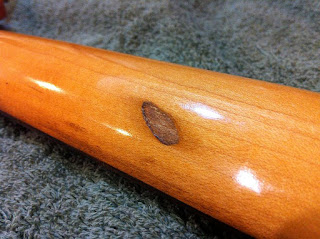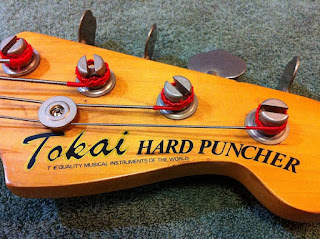Gross doesn't begin to describe this guitar. I swear there was enough DNA on it to clone a number of bass players. A thick film of nicotine/smoke deposits covered it, the metal was tarnished and I felt I need a vaccination every time I touched it.
I was really worried about the decal, when you ran your finger across the headstock it was like sand paper. It would make you shudder, I kid you not. The body has a few small dings and scratches but nothing major at all.
Disassemble...clean...get a tetanus shot.
Removal of the pick guard reveals copper(?) plates used to commonly ground the electronics negating the need to run grounding wires to each individual component. As far as I could tell this is the original wiring.
Same common ground theory applied to the pickups. Wiring was very brittle, I ended up re-soldering one connection even though I had the kid gloves on.
Color code underneath pickup assembly, OW meaning off white.
Not sure if this is from the factory like this or not. Notch cut out to allow adjustment of the truss rod without removing it from the body but you still have to remove the pick guard which is no small feat with strings on.
Nice clean neck pocket and writing on the end of the neck.
The dreaded brown bubbles of poop; scrub brush and rags over and over again and this was just the neck.
Three of the machine heads ad the number "3" on them and one had the number "2" on it, I could tell no difference between any of them. All metal parts got the long soak in WD-40. The bridge pieces ended up going into penetrating oil to help loosen the corrosion. A little chrome came off of two saddles but not a significant amount.
Machine heads back on. I resisted the urge to polish to living daylights out of them. I dig the look of a 30-year old guitar as long as it is age and not dirt.
I hope you have enjoyed learning about my classic 80s TOKAI Hard Puncher. If I could offer you any advise it would be this:
- Don't be afraid of a brand name you don't recognize. Do some research and you might find out that the instrument is well-regarded by those that are "players" versus those that are "collectors".
- Look for what I call "situational deals". Everyone in Japan wants American instruments and will pay a premium for them. Consequently, they often shun very well-made instruments of domestic origin. Use that to your advantage.
- Sometimes you just have to buy a guitar because it's fun. God forbid we have a little fun doing this, eh?
- Don't be shy in asking for help. There are many people who will gladly lend a hand (or an e-mail) to get you headed the right direction.
- Have fun. If you are doing this as a hobby and are miserable, forget about doing it for a living. Life is too short to spend time doing something you hate.
If you want to see more of my adventures in the world of stringed instrument construction, restoration, and repair visit the Rattlecan Guitar Restorations YouTube channel, friend us on Facebook, Twitter and Instagram pages and, if you're interested in supporting my projects take a look at the Rattlecan Patreon page.
Have a great weekend. Cheers!
James





































No comments:
Post a Comment